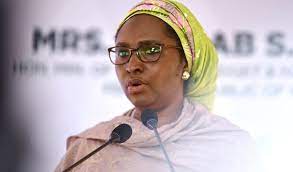
31 Aug Finance Minster confident economy on recovery path to pre-COVID-19 levels
Drawing from the impressive Q2 GDP growth rate of 5.1 percent, Finance Minister Zainab Ahmed yesterday expressed confidence in ability of the economy on recovery path to hit pre-COVID-19 levels.
Ahmed, spoke at a news conference in Abuja in company of the Minister of Information and Culture, Lai Mohammed; the Minister of State for Budget and National Planning, Clem Agba and Statistician-General of the Federation Simon Harry.
Describing the growth rate as a “positive one,” she explained that non-oil sector accounted for the GDP growth.
She said 42 out of 46 economic activities expanded during the quarter compared to only 13 at the same time last year.
On borrowing, which has dominated public conversation, she said the federal government is borrowing “sensibly” to cater to the country’s infrastructure needs and that if Nigeria does not invest in infrastructure, “we will regret it”.
“We are borrowing sensibly and we are investing in rail and other infrastructure,” she said. “If we do not do these investments, we will regret. These investments will return revenue in the future.”
Addressing the NBS report, Ahmed explained that the country’s economy would have grown above 5 percent in the second quarter of 2021 but the agriculture sector recorded slower growth, owing to security challenges.
“The 2021 second quarter growth reflects better economic performance compared to the same quarter last year. The same quarter last year, we had a negative growth of -6.10 percent. It is also better than the first quarter of 2021,” she said.
“The service sector recorded a strong performance, growing by 9.27 percent this reporting quarter, representing the fastest growth in this sector since 2010.
“The second quarter growth of 2021 would have been much stronger than the 5.01 percent but for agriculture that recorded a slightly lower growth.
“A number of bottlenecks within the system including insecurity which has negatively affected the sector negatively. Also, the industrial sector slowed down to -1.3 percent.”
The minister added that the non-oil sector contributed majorly to the growth witnessed in the second quarter.
“The non-oil sector recorded a growth of 7 percent which represents the fastest growth since the third quarter of 2014,” she said.
On how the Federal Government will finance budget deficit next year, she said there was an approval to fund deficit 50% locally and 50% externally.
She said 50% external borrowing is 6.1billion Euros with half of it from Eurobonds and the other from multilateral and bilateral sources.
She revealed that the Federal Government will begin Eurobond roadshow from the week of 11th of October.
Ahmed gave a breakdown of how the non-oil sector accounted for the new GDP in the 2nd Quarter of 2021.
She added: “Growth in Q2 2021 would have been much stronger had it not been for Agriculture recording slower growth at 1.30% due to several bottlenecks currently negatively affecting the sector and due to the Industrial sector contracting by -1.23% largely due to the over 12% contraction in Crude Oil and Natural Gas Production.
“Nevertheless, the non-oil sector was a major driver of growth during the quarter, recording a growth rate of nearly 7% which represents the fastest growth in the non-oil sector since Q3 2014.
“Specific activities which recorded growth during the quarter include: Trade, Transportation, Coal mining, metal ores, as well as Insurance, each of which recorded double digit growth.
“The report, however, also indicates that some activities such as oil refining, crude petroleum and natural gas production as well as financial services recorded negative quarterly growth.
“Overall, a total of 42 out of 46 economic activities expanded during the quarter compared to only 13 at the same time last year, while 37 activities performed better than they did last quarter (Q1).”
She added: “These figures indicate that business and commercial activities are fully returning to pre-pandemic levels as restrictions to movement, business activities, as well as domestic and international travel have been relaxed.
“When these estimates are considered along with declining inflation rate which slowed from 18.17% at the end of Q1 to 17.75% at the end of Q2 and as at July, stands at 17.38%, it is clear that the economic recovery is gradually picking up steam.
“With favourable international economic conditions expected as economic activities and normalcy returns across major economies, and focal conditions continue to improve to allow business activities, the Nigerian economy is expected to maintain a steady path to more inclusive growth.”
Responding to a question on why Nigerians are not feeling the positive effects of the GDP growth rate, the Minister of Finance said: ”Until we get a growth rate that is larger, the impact will not be felt by Nigerians.
“But we are happy that the growth rate is a positive one. We are happy to report that inflation is moving downward. The prices of some major foodstuffs, like corn and guinea corn, have started moving or going down.”
She said it is possible to sustain the GDP growth rate.
She said: “There are a number of reforms in the economy to maintain a sustainable growth. We are happy economic and business activities are fully returning to pre-COVID-19 period.”


Sorry, the comment form is closed at this time.